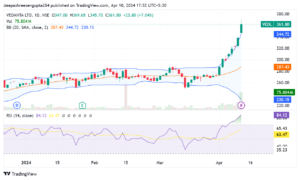In the intricate world of financial markets, certain companies emerge as stalwarts, leaving an indelible mark on investors’ minds. Vedanta Ltd. is one such entity, a conglomerate that supplies natural resources essential for global growth. In this analysis, we delve into the company’s operations, recent performance, fundamentals, and its outlook within the broader economic landscape.

SOURCE: TREADING VIEW
Company Overview
Vedanta Ltd. is a diversified natural resources company with operations spanning multiple sectors crucial for various industries. The company’s product portfolio is extensive and includes zinc, lead, silver, iron ore, steel, copper, aluminium, power, oil, and gas. This diverse range of offerings positions Vedanta as a key player in the global market, providing essential materials for infrastructure development, manufacturing, energy production, and other industrial processes.
One of Vedanta’s notable strengths lies in its strategic prowess and alliances. The company is adept at forming partnerships and alliances that contribute to its growth and sustainability objectives. These strategic initiatives are aimed at creating and preserving value for its diverse stakeholder groups, which include investors, employees, communities, and governments. By aligning its activities with the interests of its stakeholders, Vedanta seeks to foster long-term relationships and ensure mutual benefit.
A cornerstone of Vedanta’s success is its robust portfolio of low-cost, scalable assets. The company has strategically invested in assets that offer competitive advantages in terms of cost efficiency, scalability, and operational flexibility. This enables Vedanta to maintain strong profitability and generate substantial cash flows, even in challenging market conditions. Furthermore, the scalability of its assets allows Vedanta to capitalize on opportunities for growth and expansion in response to evolving market dynamics.
In addition to its financial performance, Vedanta boasts industry-leading market shares across its core divisions. This market dominance is a testament to the company’s competitive strengths, including operational excellence, product quality, and customer satisfaction. By maintaining a strong market presence, Vedanta solidifies its position as a preferred supplier of natural resources to industries worldwide, reinforcing its reputation as a reliable partner for business and economic development.
Financial Performance
Vedanta’s recent financial performance, as reflected in its stock market activity, showcases remarkable resilience and growth. The stock’s performance metrics provide insights into its strong performance in the market.
Firstly, let’s examine the trading volume. Vedanta has witnessed a substantial trading volume, with 3,64,82,136 shares being traded. High trading volume indicates significant investor interest and activity in the stock, reflecting confidence and liquidity in Vedanta’s shares.
The stock’s price movement also indicates positive momentum. Vedanta experienced a 1D low of 345.70 and a high of 367.60, demonstrating intraday volatility but ultimately closing at a high point. This fluctuation suggests active trading and investor sentiment influencing the stock’s price throughout the trading session.
Of particular note is Vedanta’s performance relative to its 52-week high. Closing at Rs. 338.00, Vedanta has surpassed its previous high of Rs. 325.35, marking a 3.89% increase. Achieving a new high indicates strong investor confidence and bullish sentiment towards the company’s prospects. It suggests that investors are optimistic about Vedanta’s future growth potential and financial outlook.
Strength and Stability:
Vedanta’s increasing relative strength over the past three days indicates its resilience and ability to weather market fluctuations effectively. Relative strength measures a stock’s performance compared to a benchmark index, such as the S&P 500 or a sector-specific index. A rise in relative strength signifies that Vedanta has been outperforming the broader market or its sector peers during this period. This suggests that despite market volatility, Vedanta’s operations are robust, and its stock is holding up well compared to its peers. A relative strength of 0.2 further emphasizes Vedanta’s strength and stability, indicating its ability to withstand market pressures and potentially offer better returns to investors.
Fundamental Analysis:
Sector and Industry: Vedanta operates within the Non-Ferrous Metals sector, specifically in the Metal – Non Ferrous industry. Non-ferrous metals are metals that do not contain iron and are typically more resistant to corrosion and rust. This sector encompasses various metals such as copper, aluminum, zinc, and lead, which are essential components in manufacturing, construction, and electrical industries. Vedanta’s focus on non-ferrous metals underscores its strategic positioning in industries that rely on these materials for various applications.
Market Capitalization: Vedanta boasts a market capitalization of Rs. 1,25,715.67 Cr., indicating the total value of all its outstanding shares in the market. This substantial market capitalization reflects Vedanta’s significant presence and influence within the market, making it a key player in the non-ferrous metals sector. A large market capitalization also suggests that Vedanta is widely followed by investors and analysts, further solidifying its status as a prominent company in its industry.
Enterprise Value (EV): Vedanta’s enterprise value, which stands at Rs. 1,95,895.67 Cr., provides a comprehensive assessment of the company’s total value, including both its market capitalization and debt. Enterprise value takes into account a company’s debt obligations, providing a more accurate representation of its overall financial health and value to potential acquirers. Vedanta’s substantial enterprise value indicates its scale and importance in the market, considering both its equity value and debt obligations.
Financial Ratios:
Price-Earnings Ratio (P/E Ratio): Vedanta’s P/E ratio of 26.46 provides insight into investor sentiment and expectations regarding the company’s earnings potential. This ratio compares the company’s current stock price to its earnings per share (EPS). A higher P/E ratio typically suggests that investors are willing to pay more for each unit of earnings, indicating optimism about the company’s future earnings growth. Vedanta’s P/E ratio of 26.46 indicates that investors are willing to pay approximately 26.46 times the company’s earnings for each share of stock. This suggests that investors have a positive outlook on Vedanta’s earnings prospects, as reflected in the relatively high P/E ratio.
PEG Ratio: The PEG ratio, which stands at 3.43 for Vedanta, provides a more comprehensive assessment of the relationship between the P/E ratio and the company’s expected future growth. The PEG ratio takes into account the company’s growth prospects alongside its valuation. A PEG ratio above 1 may suggest that the stock is overvalued relative to its earnings growth potential. Vedanta’s PEG ratio of 3.43 indicates that its stock may be considered overvalued based on its growth prospects compared to its current earnings valuation. Investors may interpret this as an indication that the stock’s price may not fully reflect its growth potential, potentially warranting caution when considering investment decisions.
Dividend Yield: Vedanta’s dividend yield of 30.01% is a measure of the company’s dividend payments relative to its stock price. A higher dividend yield indicates that the company is distributing a larger proportion of its earnings to shareholders in the form of dividends. Vedanta’s dividend yield of 30.01% suggests that the company offers an attractive dividend income to its investors, making it appealing to income-oriented investors seeking regular dividend payments. This high dividend yield reflects Vedanta’s commitment to rewarding shareholders and returning value to them through dividends.
Earnings per Share (EPS): Vedanta’s EPS of Rs. 12.78 indicates the company’s profitability on a per-share basis. EPS is calculated by dividing the company’s net income by its total number of outstanding shares. Vedanta’s EPS of Rs. 12.78 suggests that the company generated earnings of Rs. 12.78 for each outstanding share during the period under consideration. This metric provides investors with insight into Vedanta’s profitability and earnings potential on a per-share basis, which is important for assessing the company’s financial performance and growth prospects.
Price to Book Value Ratio: Vedanta’s price to book value ratio of 3.65 allows investors to evaluate the company’s valuation relative to its book value per share. This ratio compares the company’s current market price per share to its book value per share, which represents the company’s net asset value on a per-share basis. A higher price to book value ratio may suggest that the stock is overvalued, while a lower ratio may indicate undervaluation. Vedanta’s price to book value ratio of 3.65 suggests that investors are willing to pay approximately 3.65 times the company’s book value per share for each share of stock. This indicates that the stock may be trading at a premium to its book value, which could reflect investor confidence in Vedanta’s future growth prospects and profitability.
Reason Behind the Surge
The increase in holdings by prominent institutional investors such as BlackRock, Abu Dhabi Investment Authority (ADIA), and domestic mutual funds like ICICI Mutual Fund and Nippon India Mutual Fund signals a positive sentiment towards Vedanta Ltd. and its future prospects. Let’s delve deeper into the implications of this significant development:
Institutional Confidence: When major institutional investors like BlackRock and ADIA increase their holdings in a company, it often indicates a high level of confidence in the company’s management, business strategy, and potential for growth. These institutional investors conduct thorough due diligence before making investment decisions, and their increased holdings suggest that they believe Vedanta is well-positioned to deliver favorable returns in the long term.
Strategic Alignment: The decision by institutional investors to increase their holdings in Vedanta may also reflect a strategic alignment with the company’s goals and objectives. Institutional investors often seek to align their investment portfolios with companies that are poised for growth and have strong fundamentals. By increasing their stakes in Vedanta, these investors may be signaling their belief in the company’s strategic direction and its ability to capitalize on opportunities in the market.
Market Perception: The actions of institutional investors can influence market perception and investor sentiment towards a company. When well-respected institutions like BlackRock and ADIA increase their holdings in Vedanta, it can instill confidence among other investors and potentially attract additional capital to the company. This increased investor interest may lead to upward pressure on Vedanta’s stock price and contribute to its overall market valuation.
Long-term Outlook: Institutional investors typically take a long-term view when making investment decisions. The fact that BlackRock, ADIA, and domestic mutual funds like ICICI Mutual Fund and Nippon India Mutual Fund have increased their holdings in Vedanta over the last four months suggests that they see value in holding onto their investments for the foreseeable future. This long-term outlook aligns with Vedanta’s focus on sustainable growth and value creation for its stakeholders.
Conclusion and Outlook
Vedanta Ltd. stands as a formidable force in the natural resources sector, with a diversified portfolio and robust financial performance. Its strategic focus on creating and preserving value, coupled with its strong market position, makes it an attractive proposition for investors seeking exposure to this segment. Despite the challenges posed by the dynamic market environment, Vedanta’s resilience and adaptability position it favorably for future growth and value creation. However, investors should remain vigilant and conduct thorough due diligence to mitigate risks inherent in the sector and broader market dynamics. As Vedanta continues to navigate through evolving landscapes, its steadfast commitment to excellence and value creation will likely pave the way for sustained success in the long run.
ALSO READ: The Role of Central Banks in Influencing Stock Market Trends




